Peter MALONE
Saturday, 18 September 2021 19:20
Sunday in the Country
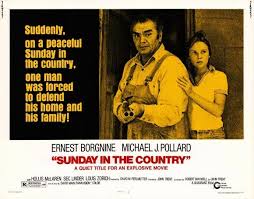
SUNDAY IN THE COUNTRY
Canada, 1974, 92 Minutes, Colour.
Ernest Borgnine, Michael J. Pollard, Hollis McLaren?, Louis Zorich, Cec Linder.
Directed by John Trent.
Sunday in the Country is a placid title for the early sequences of this Canadian film, but ironic for this violent thriller. It is a moralising story about the ordinary man (church-going, hard-working, proper) and his innate capacity, and even desire, for violence. Ernest Borgnine is a farmer who confronts three, brutal criminals and finds that he too is sadistically violent. The film strives for credibility by devoting much attention to the quiet country atmosphere -
which makes the exploration of violence more ugly. We are asked how we would react - difficult because the psychotic killer (Michael Pollard) is quite repellent. Interesting and useful for discussion of our aggressive tendencies.
1. The ambiguity of the title and its irony in view of the whole film? The tranquillity of the opening, the tone of the song, calm?
2. The contribution of Panavision, colour, the locations, the contemporary music etc.? How real a location was presented? Could audiences identify this as real, identify with the characters and the issues?
3. How valuable a social documentation about criminals and violence, about the ordinary man's reaction in crisis to violence? Did the film exploit its theme and wallow in violence?
4. How did the film establish the character of Adam Smith? The significance of Adam as the archetypal man, Smith as the name of the common man? An ordinary farmer, an ordinary man, church-going and God-fearing, observing the laws of the Sunday, going to church, encountering his friends, doing a job at the station to collect a parcel? His relationship with Luke, with his granddaughter Lucy? What moral stances did he take and how were these expressed? What values did he stand by? What kind of a person was he? Could the audience identify with him at the beginning?
5. Could audiences identify with Lucy? A younger generation, a freer attitude, her attitude towards Sunday, country values, her relationship with her grandfather?
6. The contrast with the couple on the road? Their moral stances, relationship with each other, the presentation of varying moral points-of-view? How adequate a preparation for what was to follow?
7. How well did the film communicate the atmosphere of the church? The people, the religious point of view? The tranquillity of the way of life in the country?
8. The intrusion about the news of the criminals, the gradual change of atmosphere? First impression of the criminals themselves? Any sympathy for them? Response to the ugliness of their killings? The change in tone of the film?
9. How was this built up by the sense of menace, the car chase, the victims being trapped, the violence of the murders and the presentation of the corpses?
10. How important was it for Adam to be involved in this enterprise? The details of his preparation to meet the criminals, the intensity of his involvement, what aspects of his character were being drawn on? His ability to shoot, overpower the men? His delight in finding them?
11. What made Adam torture the criminals? The prolonged nature of the torture, his sadistic satisfaction? The overall effect on Adam? The ugly side of his character? The reaction on the men, Luke's attitudes, Lucy’s?
12. Why did Luke comply with Adam's commands? What effect did it have on him?
13. How credible was Lucy's horror? The audience seeing the violence through her eyes? Adam's reaction in terrorizing and torturing her? The importance of her escape? Her foolishness in believing the story about the water? The violence she suffered and the points that Adam made? The disconnection of the phone? Her escape and her reliance on her boyfriend? Adam being tempted to shoot her because she was thwarting his enjoyment of exercising God-like vengeance? What had happened to him?
14. The emphasis on Ackerman? His being in chains, his being bashed, the ugliness of his death? Was justice meted out to him accurately? Did he suffer too much? Audience sympathy for him?
15. The contrast with Leroy throughout the film? His appearance, way of speaking, ugliness? His madness? His encounter with Lucy, his escape, his attitudes of vengeance?
16. The intervention of the police and the restoring of normality? The effect of this on Adam? His unwillingness to let official justice intervene? The irony of the police being killed? To what purpose? As a providing of the plot for a confrontation between Adam and Leroy? Adam's final implacable shooting of Leroy?
17. What comment on violence did the film make? How different was Adam from the criminals? What kind of violence is in each man? Did the film present this tellingly or did it exploit it?
18. The parable value of this kind of story? A searching of the values of law, justice and its administration, morality, man playing God, instinctive violence within man, the city and the country?
Published in Movie Reviews
Published in
Movie Reviews
Tagged under
Saturday, 18 September 2021 19:20
Sunburn
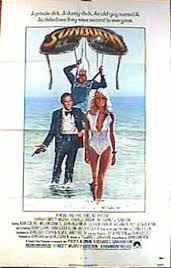
SUNBURN
US, 1979,99 minutes, Colour.
Farrah Fawcett, Charles Grodin, Art Carney, Eleanor Parker, Joan Collins, John Hillerman, William Daniels, Keenan Wynn.
Directed by Richard A. Sarafian.
Sunburn seems like a follow-on from Foul Play in writing and plot and it is acted by Farrah Fawcett and Charles Grodin in the Goldie Hawn-Chevy? Chase style (though with less assurance and polish). Sunburn is one of those ultra-glossy, affluent, fashionable Acapulco insurance investigations - with eccentric families, murders, car chases and derring-do finale. The supporting cast, led by the humorous Art Carney, is very good. Farrah Fawcett was not successful in building her career with Somebody Killed Her Husband and this film. Direction is by Richard C. Sarafian who has made such interesting films as Man In The Wilderness.
1. Popular entertainment: the blend of thriller, glamour, affluence, fashion, Mexican locations, romance? The perennial appeal of this kind of film?
2. The production values, the gloss, the score, the songs, special effects?
3. Audience interest in the basic set-up of the plot: Acapulco and its atmosphere, the initial phone call, suicide and subsequent investigation, the background of insurance payouts?
4. Jake as hero? His being demanded by the boss, his personality in himself, awkward and quiet? His skills? The encounter with Ellie on the plane? Ellie as attractive heroine? The humour of her luggage? The renting of the house? Scares in the house from lizards to burglars? Audiences identifying with them as a romantic couple and their solving of the mystery?
5. The details of the investigation: the family, the Ortegas, the yacht, the various documents? The continual dangers - the cupboard and Jake's spending the night there, dogs, surveillance and phone-bugging, the yacht and the pursuit? The various groups watching the hero and heroine?
6. The contribution of the car chase and its duration, special effects, especially the finale in the bullfighters' arena?
7. Art Carney's comic contribution as Al? His work, information, skill, encountering the dangers, the dance? His surviving? In comparison with the young?
8. The build-up to the final attack and the derring-do - swinging on ropes, fights etc.?
9. The basic secret of the family? Blackmail, the Mafia, the mother and her secret, Carl and his double deals and ultimate death in the church, Joanna and her seeking the truth?
10. Dobbs and his being present at the initial suicide, the background of his massage work, connections with the Mob?
11. Glimpses of Acapulco society, the estate agent and his snobbish description of the house, the Ortegas and the humorous satire on permissiveness, the insurance men and their not wanting to pay out the money?
12. The humour of the discovery of the final evidence and the payout?
13. The glamorous background to the thriller aspects of the film? The romance between Jake and Ellie? Their skills in their work? Themes of right and wrong? The seeking out of the truth? Popular entertainment with the light touch?
Published in Movie Reviews
Published in
Movie Reviews
Tagged under
Saturday, 18 September 2021 19:20
Sun Also Rises, The
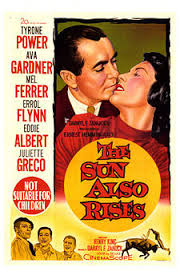
THE SUN ALSO RISES
US, 1958, 130 minutes, Colour.
Tyrone Power, Ava Gardner, Mel Ferrer. Errol Flynn, Eddie Albert, Juliette Greco, Gregory Ratoff, Robert Evans.
Directed by Henry King.
The Sun Also Rises looks now like rather old-fashioned Hemingway. Many films have been made of his novels. The closest in style to this one would be the Jennifer Jones/Rock Hudson version of A Farewell to Arms made just before this film. It is long, somewhat drawn-out, a portrayal of rather affected or artificial 'types', not the people we are used to, but people that Hemingway assures us were children of their times. There is romance, colour and an air of unreality. This film seems to involve a lot of effort, to what purpose it is not always clear.
Tyrone Power is at home in this kind of sensitive-misunderstood role, Ava Gardner at home in hers. An ageing Errol Flynn portrays an ageing Errol Flynn who probably tried to live out the popular conception of Hemingway. Mel Ferrer is probably as irritating to the audience as he is to the characters in the film. Not a masterpiece by any means, but a popular kind of melodrama, somewhat pompous and dated.
1. The quotation for the title came from the Old Testament book of Ecclesiastes, Chapter 1, verses 1 - 11. Does this passage throw light on what Hemingway intended by his novel?
2. This generation of the 20s was called "the lost generation". What does this mean? why were they lost? (What generation has not been "lost"?)
3. The picture of fashionable society (the pre-jet set)? Was their way of life interesting, enjoyable? Their values? What did they live for? Were they selfish? Self -centred? Any regard for others? why did they love Paris and Spain?
4. Does this film throw light on Hemingway's ideas about life and what it is to be human, a man?
5. Does the film offer insight into human nature, behaviour, society? Jake: war service, relationship with Brett during the war, the gentle American, the typical American in Paris - a reporter, his importance, capacity for relationships, relied on by Robert, Brett; his evening with Georgette - its purpose; his love for Brett - how selfless; his always responding to her needs? Was he an interesting character, a worthwhile character, an admirable character?
- Brett: as a beautiful socialite, in the war, her marriage and widowhood and effect on her, her vivaciousness at the restaurant, being feted by the Count and society, her self-centredness, love for Jake, her alcoholism - why? Her dependence on Jake? Did she lead Robert on - did she have real regard for him? Why was she to marry Mike - what did she see in him? Did she love him? Why the infatuation and affair with Romero - what was she after? Why did she let him go and walk out? The return to Jake? What future did she have? Robert: a 'romantic' figure? Were his motivations convincingly presented? Why was he obsessed with Brett - was his behaviour credible? His treatment by Mike Campbell? His final jealousy - his return to his wife?
- Bill: as a friend to Jake, to Mike, his function in the film?
- Mike Campbell: an interesting character, a credible character? His love for Brett - genuine? His enjoyment of bull-fighting, drinking? His loss of money, disgust for Robert? What future did he have?
- Romero: what a bullfighter represents, object of Brett's infatuation - why? His infatuation with her? Why did he leave her?
6. So much of the footage of the film went to the picturing of Spain in summer, the atmosphere, the romantic other-worldliness of the fiesta, the bullfighting. Did this fit into the film, to the Hemingway mystique, to the significance of the film's theme and the people it presented?
7. Bullfighting - the colour, pageantry, physical strength, grace and skill, the applause of the crowd, the clash with the bull, the physical and psychological elation - how important for this film and its themes?
8. Was the resolution of the film worthwhile? How tentative? In this kind of world was anything else possible?
9. How attractive was the world of this 'lost' generation? How worthwhile? How empty?
10. What did the film portray of human nature? Well?
Published in Movie Reviews
Published in
Movie Reviews
Tagged under
Saturday, 18 September 2021 19:20
Summertime

SUMMERTIME
Italy, 1983, 70 minutes, Colour.
Luca Barbareschi, Susi Gilder, Douglas Ferguson, Malcolm Botway.
Directed by Massimo Mazzucco.
Summertime is a pleasant and attractive first film by Italian fashion photographer Mazzucco (pictured). It was made with a small budget over a period of several years. The film was made in collaboration with Luca Barbareschi who plays the hero. After an opening in Los Angeles and Disneyland, the film focuses on New York as seen by a young Italian visitor - some of the sights, the eccentric people, the atmosphere, the underside of New York. There is attraction, there is disappointment?
Isolation and communication are themes. The film has a short running time but is strong in characterisation and feeling. There is an attractive musical score including work by Sate and a variation on Gershwin's Summertime. The film was made in winter time - hence an irony of tone in the film.
1. An effective first feature by a fashion photographer? The quality of colour photography? Editing and pace? Sensitivity to character and eccentricities? The variety of New York location photography? Musical score? Use of songs? The grand finale - 'It Is My Life' with the tongue-in-cheek final comment.
2. The point of view of Mazzucco: an Italian in America, the Italian background, the Italian male? The American female? The colour and Disneyland atmosphere of Los Angeles compared with the sombreness of New York? The strange gallery of characters? Pictured with compassion and understanding? Humour and irony? Mazzucco's fascination with New York as a city, its lifestyle? An Italian perspective?
3. The mood of the opening with the attention to Disneyland and its attractions, Marco and Valerie enjoying themselves? The transition to New York? Marco alone? Exploring New York on his own and feeling lonely, isolated?
4. Marco's arrival by bus and leaving by bus? The audience entering and leaving with him? Sharing his perspective and insight?
5. New York as seen by the audience in winter time: the streets, the buildings, the subway, hotels, the skyscrapers and facades of glass, affluence? The underside with its squalor? Apartments underground etc.? A fair picture of New York?
6. The range of characters Marco encounters: the insurance man with his long spiel and the tracking shot along the street, insurance, diamonds and gold, the friendly American - even with his martial arts protection? The friend on the bus - hospitality and generosity, his apartment, squalor, art, his being a transvestite - interested in Marco yet not exploiting him? The black girl in the bar, the people in the bar and their drinking, playing billiards? Her speaking French? Apartment, lovemaking?
7. The atmosphere of the fashion show and its glamour, Valerie and her hopes for a commercials contract? The nightclub and its glamour acts? The gay tones? The contrast with the Mc Donalds- style breakfast restaurant with isolated people eating - and the eccentric man opposite Marco putting sugar on everything? The streets, the subway?
8. Marco and his perspective, a pleasant man, friendly, the phone calls to Valeide, her offhand attitude, his hopes, the outings, the friend and his accepting hospitality, the final talk with Valery?
9. Valerie and her glamour, casual, self-preoccupied, the long discussion in the cafe about belief in self and courses, the defence against hurts in the outside world? Her performance, standing him up, her apologies and the farewell?
10. A portrait of New York in the '80s? A satisfying kind of film?
Published in Movie Reviews
Published in
Movie Reviews
Tagged under
Saturday, 18 September 2021 19:20
Street Smart
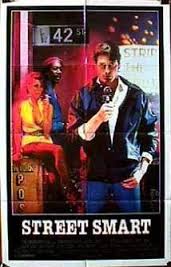
STREET SMART
US, 1987, 92 minutes, Colour.
Christopher Reeve, Morgan Freeman, Kathy Baker, Mimi Rogers, Andre Gregory.
Directed by Jerry Schatzberg.
Street Smart is a slick thriller about the New York streets, 42nd Street and the pimps and prostitutes, the media.
Directed by fashion photographer Jerry Schatzberg (Panic in Needle Street, Scarecrow, Puzzle of a Downfall Child), the film is a glossy look at New York. Christopher Reeve is an ambitious journalist who invents a story about the pimps which leads to extraordinary consequences for his own life, principles and those close to him. The film also has some satiric and cutting comments on media and media communication.
This is a more ordinary role for Christopher Reeve and he seems quite at home. Cathy Baker gives a lively performance as a prostitute, Mimi Rogers -is the heroine. There is a strong supporting cast including Andre Gregory as an ambitious editor and Morgan Freeman (Lean on Me) as the street smart pimp. He Was nominated for an Oscar as best supporting actor in this role.
The film is slick, raises many questions about integrity, the media - and has a shock ending which leaves audiences with a question mark.
I. Impact of the story, New York, violence, the print and television media, the role of the media, police, courts and justice?
2. The world of New York: fashionable, the magazine? 42nd Street: the pimps and the prostitutes? Prisons and courts? An authentic feel? Musical score?
3. The title and its ironies: the street, Jonathan and his research, writing, his TV programme called Street Smart, its effect on him, his behaviour and the resolution of the plot?
4. The plausibility of the plot: the magazine, the ambitions, the research, 42nd Street, the cases, the repercussions in the courts, justice? Characters and dilemmas?
5. Jonathan and his work, Ed and the interview, the idea for the article, Jonathan going out, picking tip Punchy, trying to get information? Alison and her help, being accosted and her fear? The failure of the interviews? Jonathan inventing the whole story, Alison helping him, the success, the cover? His relationship with Alison? Jobs, the television people coming for interviews, his starting the Street Smart programme? Candid Camera, exposes of injustice? The courts identifying Vast Black as Tyrone? The lawyers and their interrogation, the pressures? Jonathan meeting Fast Black, the tour of the city, the explanations? The discussions with Punchy, and the sexual encounter with her? Ed throwing the elaborate party, Fast Black and Punchy being celebrities? The irony of New York society feting these characters? Alison and her realisation, anger? The District Attorney and his photographing Jonathan? Challenging him? The question of the notes for the article, contempt of court? His going to jail? Seeing Fast Black at work, terrorising people and then relenting? The attack on Allison? Punchy's death? Jonathan going along, supplying the notes? The disgust of the magazine's lawyer? His release, going back to his programme, setting up Reggie with the money, setting up Reggie to clash with Fast Black, the shooting? His photographing it? Jonathan manipulating justice on Fast Black - street smart?
6. Fast Black and his style, with Reggie as his assistant, as a pimp, the gross fat client and his death? Courts, protection, the District Attorney wanting to get him? His angers, provoking people, threatening and then letting them off? His dealing with Reggie, the prostitute? With Jonathan? Taking Jonathan around, the discussions With the lawyer, the celebrity? His killing, Punchy and the sadistic threats to her eye? Alison and her hospitalisation? His freedom, the interview, the irony of Reggie shooting him?
7. Reggie as an ordinary young man, doing jobs for Fast Black, relationship with Jonathan, the set-up with the money, his shooting Fast Black and going to jail?
8. Alison as heroine, pleasant, going out, and helping, being accosted, her fear, the party and her anger with Jonathan, the physical abuse and hospital? The truth?
9. Punchy, the interview, her friendliness, her work, sexual encounter? With Fast Black? The D.A. Picking her up, trying to get the truth? Her getting tired, wanting to give up, the brutality of Fast B1ack's threatening her eye? Her murder?
10. The world of 42nd Street, violence and vice, manic violence?
11. The world of the magazine, Ed and his ambitions, throwing the party, the lawyers, Jonathan in jail and trying to get him out, the interviews, the motivations?
12. Themes of media, survival, exposes? Street Smart?
Published in Movie Reviews
Published in
Movie Reviews
Tagged under
Saturday, 18 September 2021 19:20
Summer School
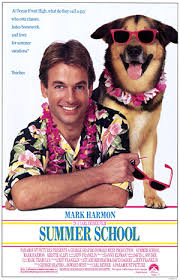
SUMMER SCHOOL
US, 1987, 92 minutes, Colour.
Mark Harmon, Kirstie Alley.
Directed by Carl Reiner.
Summer School is a comedy by Carl Reiner, director of so many of Steve Martin's comedies. It is a slight comedy, a farcical To Sir With Love. Television star Mark Harmon portrays a gym teacher asked to take remedial English during the summer holidays. He has an oddball group of unwilling students. Kirstie Alley is the attractive history teacher in the next room.
Needless to say the film shows the antics of the group - one is pregnant, one is dyslexic, one is Italian, two are absorbed by movies and The Texas Chainsaw Massacre, one is a male stripper at night., etc. Needless to say, they band together to support the teacher and do well in the final exams. Spasmodic humour.
1. Enjoyable American comedy? California? Types? Education? The tradition of To Sir With Love,?
2. California locations, the sea and the sunshine, the summer holidays? The schoolrooms? The use of special effects - especially horror after The Texas Chainsaw Massacre? The musical score, songs? The party, the night club, etc? The final song?
3. The title, the focus, the summer, education, teachers and students?
4. Freddie Shoop: gym teacher, about to go on holidays, his girlfriend going without him? Gil and his pressure to do the job? Unwilling? The meeting with the group, their taunting him? His lackadaisical attitude? The meeting with Robyn, attractive, clashes with her? The classes, the swearing, the chaos? Their going on the field trip and enjoying it? The attacks by Gil? The pressure of the parents? His getting to know each of the students, their troubles, the contract, giving them their wishes? The party and the uproar at home? The driving lessons? Pam moving in? Robyn's reaction? Her helping him with the students? Discovering their backgrounds? Prepared to go to jail for the two with the alcohol? The build-up to the climax, the principal letting him stay, the doing of the exams? The relative success of their studies? Teaching winning out in the end?
5. Robyn as attractive heroine? Good teacher? Relationship with Gil? Disgusted with him at the end? Fencing with Shoop?
6. Gill and his antagonism, wanting to get rid of Gil, the principal, ridiculing him? The new teacher - and the horror make-up performance? His keeping his cool? His not winning in the end? The principal and his listening to the parents, stances?
7. The group of students: Denise, her dyslexia, getting her driving licence, being able to read and improving in the exam? Pam and her absentmindedness, going surfing, her crush on Shoop, moving in and looking after him, growing up? Doing well? Larry and his always being asleep, the discovery that he was the stripper? David and Francis and their nicknames, out of control, the parody of the movies, The Texas Chainsaw Massacre, the act with the rabbits, the showing of the film, frightening the teacher with the make-up? Screening the Massacre? Their change, Francis' nightmare and the happy household? His father being proud of him? Jerome and his going to the bathroom, reappearing and doing the best? Rhonda and the baby, the football jock and his care for her, helping her with the birth? His father being proud of him? Anna-Maria? and her coming from Europe, into the spirit of things? Allen and his being clever, his grandmother, his being made the fool?
8. The various set pieces: classroom, the outing, the screening, the beach, the party?
9. The reality and unreality of this portrait of California? Students? Summer holiday? Willingness to learn?
Published in Movie Reviews
Published in
Movie Reviews
Tagged under
Saturday, 18 September 2021 19:20
Summer Stock
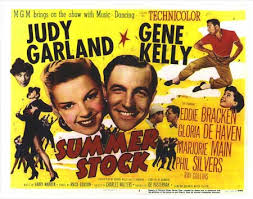
SUMMER STOCK
US, 1950, 109 minutes, Colour.
Judy Garland, Gene Kelly, Gloria de Haven, Carlton Carpenter, Eddie Bracken, Phil Silvers, Hans Conried, Marjorie Main.
Directed by Charles Walters.
Summer Stock was Judy Garland's last musical at M.G.M. She had established herself for a decade with The Wizard of Oz, the musicals with Mickey Rooney and a number of musicals with her husband Vincente Minnelli, including Meet Me At St Louis. Here she is teamed with Gene Kelly, with whom she worked in For Me And My Gal. Gene Kelly was still to make his successful films On the Town, An American in Paris, Singin' In The Rain. There is enjoyable support from a cast led by Phil Silvers. The production was difficult because of Judy Garland's health and weight problems. However, it all comes together as a typical enough M.G.M. musical with some entertaining numbers, especially in the finale show. Direction is by Charles Walters, who choreographed many of Judy Garland's early musicals and directed her in Easter Parade with Fred Astaire. Other Walters musicals include Good News, Lili, The Glass Slipper, High Society and The Tender Trap.
1. The popularity of the M.G.M. musicals in the 1940s and 1950s? Their impact now? Stars, songs, thin plots, comedy routines, choreography?
2. The colour photography, the use of the sets? Costumes and decor? Insertions of songs, choreography?
3. The impact of the stars - Judy Garland and her style, singing, dancing? Gene Kelly and his dancing? Phil Silvers and Marjorie Main and their comedy? Eddie Bracken's comic contribution?
4. The thin plot and its plausibility: the difficulties of Jane on the farm, the pride of the town and its exclusive attitude towards visitors, the summer stock company coming for rehearsals? Romantic tangles? Work? The crisis for the show and its success? Typical musical comedy material?
5. Judy Garland as Jane, giving greater strength and some depth to the character - farm, buying the tractor, the help of Esme, exasperation with Abigail, the work routines, the antagonism towards Ross and the troupe? Gradual interest? The historic dance? The clashes with Orville and his father? Abigail's leaving the show and Jane stepping in? Judy Garland's songs and dancing?
6. Gene Kelly as hero - producer, director, relationship with Abigail, exasperation with Blake, attraction towards Jane, explaining show business and the nature of songs in musical comedy to her? Direction of the show and the happy ending with Jane?
7. The support of Eddie Bracken and the bossed-about son and the comedy of father-son relationships? His final defiance of him? Abigail as the spoilt sister and her avoiding work, acting as a prima donna, being disappointed in going to New York? Esme as the Ma Kettle type of housekeeper? Phil Silvers and the American style zany comedy - and the wrecking of the tractor? Hans Conried as the inflated musical comedy star? Ray Collins as Orville's father?
8. The humour of the clash between country people and city people? The awkwardness of the troupe going out to do the farm chores? Their watching the country dance and then taking it over?
9. The show business atmosphere of the plot? 'The show must go on'? The insights into production, rehearsals, techniques? The contribution of the songs and dances?
10. The place of American musicals in the film tradition? The contribution of this kind of musical?
Published in Movie Reviews
Published in
Movie Reviews
Tagged under
Saturday, 18 September 2021 19:20
Summer Rental
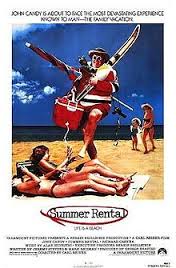
SUMMER RENTAL
US, 1985, 83 minutes, Colour.
John Candy, Richard Crenna, Rip Torn, John Larroquette.
Directed by Carl Reiner.
Summer Rental is a pleasant pastime, an enjoyable piece of Americana. It is a star vehicle for the large comedian John Candy who appeared with Tom Hanks in Splash and Volunteers. It was directed by comedian director Carl Reiner, director or such entertainments as The One and Only, Oh, God, the Steve Martin vehicles Dead Men Don't Wear Plaid, The Man With Two Brains, All of Me. It is a comedy about being busy, having holidays, ordinary people enjoying themselves and the clash with snobs.
1. A good-natured family entertainment?
2. Florida, the film as a piece of Americana, summer on the beaches, holiday styles, sailing? Special effects - especially for the sailing? The musical score, songs?
3. The basic situation, family pressures, the job and Jack's pressure. his seeing danger instead of flies on the radar screen? The kids and their reaction to the rat-race? His wife? Cars on the freeway, work and mistakes, the need for a holiday?
4. The departure and the sense of pressure, accidents, squabbles? The drive? The build-up? The arrival, finding the house, Jack and his sunburn, the lifeguards and the daughter, trying to get a meal, the line-up and the lobsters, their leaving the restaurant after the quarrel, finding The Barnacle? The irony of their being in the wrong house and their being turned out? Being on the water and hitting the Incisor? The set-up with the clash? The predictability of the plot - but enjoyable nonetheless?
5. Jack as a character, John Candy's presence, comic style? work, family, the holiday? His edginess, slobby style and the jokes about being fat? His arrival, the joy, the dog, fears of the water, the sunburn? Pellet and the clash about the lobster, their being ousted, the crowd passing by, the accident and his leg, the rain, television etc.? Vicky coming in from next door and the comedy about her silicone breasts? The crowd coming into the house? Scully and his friendship, sailing, talking, learning? Pellet and the clash? Defiance? The enterprise of the family helping to recondition the boat, the reconciliation, the race and the win?
6. Jack's wife, home, holiday, support, the participation in fixing the boat? The kids - cute and typical? The boyfriends?
7. Pellet and his nastiness, snobbery, meanness, rank, his boat being hit, revenge, pettiness, the final race and his comeuppance?
8. Scully and his restaurant, his cheapskate methods, pirate style, the crew and their motley garb? Friendship with Jack, training him, the challenge, repairing the boat, winning? The pirate style?
9. The rebuilding of the boat and the enterprise uniting the whole family?
10. The summer people, the snobs, the crowds - and the send-up?
11. The comic styles, slapstick comedy, the humorous patter?
12. An entertaining blend of American sentiment and humour?
Published in Movie Reviews
Published in
Movie Reviews
Tagged under
Saturday, 18 September 2021 19:20
Summer Lovers
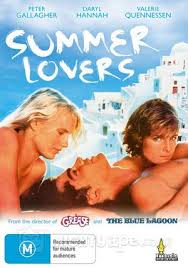
SUMMER LOVERS
US, 1982, 98 minutes, Colour.
Peter Gallagher, Daryl Hannah, Valerie Quinessen, Barbara Rush.
Directed by Randall Kleiser.
Summer Lovers is a glossy exploitive movie written and directed by Randall Kleiser, who made a number of telemovies but came to success with his direction of Grease and The Blue Lagoon with Brooke Shields and Christopher Atkins. He purports to tell the story of American tourists, the younger generation, enjoying the sun and freedom of the Greek Isles. The emphasis is on sun, sand and water - with plenty of sexuality and nudity. It is all put together with music from many contemporary singers and popular songs - with some of the lyrics adapted for the action of the film.
Some reviewers have seen it as "a paean to limitless hedonism" or a questioning of the role of monogamy. It certainly shows the rather inhibited Americans, the innocents abroad in Europe, encountering the experience of the Europeans, especially in moral values. The couple adopt a French girl and set up a menage a trois. Commentators have noted that the relationship between the two girls is explored far better than the relationship with the boy. Daryl Hannah, who appeared as one of the replicants in Blade Runner, is the heroine. Peter Gallagher, the second idol of The Idolmaker, is the hero and Valerie Quenesson (the Princess in Conan the Barbarian) is the European archaeologist. There is a guest role by Barbara Rush, who had appeared in Kleiser's short film for his thesis at U.C.L.A. Synthetic American film-making of the permissive kind.
1. Interesting, entertaining? Youth film? Exploitation? For what audience?
2. Colour photography, gloss? The introduction to holiday-makers going to Greece? Greece and its beauty? The focus on the villages, mountains, water, beaches? Nightlife of the Greek Islands in the summer? The natural beauty, the invasion of the tourists? Exploitation? Editing and colour?
3. The songs and their selection? The range from the '70s and '80s? As background, mood? Lyrics related to action?
4. How realistic the plot? How contrived? Fantasy/lreality of freedom? The Greek tradition of nature, sun, warmth? The focus on the body, nudity? Sex and values? Holiday reality? American innocents abroad in Europe?
5. The introduction to Michael and Kathy: arrival. American background? Ideas of freedom? Inhibited in fact? Their relationship? Living together? Letters home? The visit of Kathy's mother and her friend and the repercussions? Expectations, values? The challenge and change? What happened to them - for better. for worse? The freeze frame leap at the end? Temporary ending - permanent?
6. Michael as hero: his relationship to Kathy, freedom, his eyes being opened? The fascination with Lina and observing her (as did the audience from his point of view)? Following her, the encounter on the beach, nude swimming, the swimming, the sexuality? His reaction, hers? Communication and lack of communication? Moodiness? His change of attitude towards Kathy?
7. Kathy as the ordinary American girl? Love for Michael? Setting up house, enjoying the holiday? Suspicions, jealousy, the possibility of the one night stand with the Greek young man - and her inability to do it? Lina and her impact on Michael, her being followed, cool and controlled, the sexual encounter and her casual approach? The detail of her work and sophistication?
9. Kathy's encounter with Lina. the visit. their friendship? The threesome? In ordinary situations, sexually? Lina’s moving in? The change of ideas, feelings? The detail of their life together - outings, the humour of the meals, especially with Michael's cooking? Michael and his relationship with each of the girls? The girls relating to each other - with more depth? The yachting party? The birthday party and the mess?
10. Kathy's mother's arrival, her friend? Their reaction to the seeming permissiveness? The meal together? The repercussions of the visit?
11. The cruise, the drag queen, the variety of sexual expression? Nightlife, dancing? Motor bikes and the accident? The film set on the beach?
12. Lina and her independence? Going off with the young man? The repercussions on Kathy and Michael and their inability to cope?
13. Leaving, packing up, the bare house? Lina’s arrival by bike at the airport and their not leaving? The final image?
14. To what purpose the film? The comment about limitless hedonism, monogamy, freedom, inhibitions - or experimentation and the non-permanent Summer Lovers?
Published in Movie Reviews
Published in
Movie Reviews
Tagged under
Saturday, 18 September 2021 19:19
Summer Holiday/ 1962
SUMMER HOLIDAY
UK, 1962, 109 Minutes, Colour,
Cliff Richard, Laurie Peters, Melvyn Hayes, Una Stubbs, Teddy Green.
Directed by Peter Yates.
Summer Holiday was one of several vehicles to popularise Cliff Richard in the early '60s. The Young Ones, Finders Keepers were other films for him. The films also gave opportunities for young directors to make British musicals e.g. Sidney J. Furie and with this film Peter Yates. They later had strong careers in Hollywood, especially Yates with such hits as Bullitt, Murphy's War, The Hot Rock, For Pete's Sake. Cliff Richard has been a durable British singer for more than two decades and the film is very pleasant obvious entertainment with production numbers, European locations, Cinemascope and colour. The film has a strong supporting cast including Ron Moody and David Kossoff. Very much a product of its time, interesting as an example of a British musical, the work of Peter Yates, a focus on the talent of Cliff Richard.
1. What is the main appeal of a musical? what audiences like musicals? This as an example of the 60s? Its appeal and impact now?
2. The appeal of Cliff Richard, the young audience, the youthful characters, colour, wide-screen etc.?
3. The use of locations, the tour of Europe, the varying cinematic and editorial styles, especially for the choreography and the travel?
4. The journey structure of the film and its continued interest? Athens as the goal, the initial preparations, the accident with the girls, stowaway, crises and climax, success? Easy audience involvement?
5. How real did the characters and situations seem to be? How unreal or contrived for the musical genre? Audience response to these contrived characters?
6. The quality of the music, songs and lyrics, choreography? The use of locations for the choreography? How well did the film use musical conventions?
7. The atmosphere of the opening, the preparations of the bus, the theme of the summer holiday?
8. How interesting were the boys as characters? Serious, humorous? The comparison with the girls? The initial dance, the different characters amongst the girls? Barbara and her first appearance as a boy, the revelation of the truth?
9. The presentation of youthful affection and the discussion of falling in love?
10. The satire on Barbara's lover and her possessiveness, her ambitions? Her bossing the agent around? The devious ways to stop the bus? The humour of the French court, walking up the mountain etc.?
11. How interesting and entertaining was the incident in Yugoslavia? The mistake about the bread, the marriage routine?
12. The climax and everything coming to a head in Athens? The British consul and his help? The humour of the press conference, the mother making the best out of very situation?
13. The appropriate happy ending? The entertainment value of musicals? The ordinary values that they appeal to in the ordinary audience?
UK, 1962, 109 Minutes, Colour,
Cliff Richard, Laurie Peters, Melvyn Hayes, Una Stubbs, Teddy Green.
Directed by Peter Yates.
Summer Holiday was one of several vehicles to popularise Cliff Richard in the early '60s. The Young Ones, Finders Keepers were other films for him. The films also gave opportunities for young directors to make British musicals e.g. Sidney J. Furie and with this film Peter Yates. They later had strong careers in Hollywood, especially Yates with such hits as Bullitt, Murphy's War, The Hot Rock, For Pete's Sake. Cliff Richard has been a durable British singer for more than two decades and the film is very pleasant obvious entertainment with production numbers, European locations, Cinemascope and colour. The film has a strong supporting cast including Ron Moody and David Kossoff. Very much a product of its time, interesting as an example of a British musical, the work of Peter Yates, a focus on the talent of Cliff Richard.
1. What is the main appeal of a musical? what audiences like musicals? This as an example of the 60s? Its appeal and impact now?
2. The appeal of Cliff Richard, the young audience, the youthful characters, colour, wide-screen etc.?
3. The use of locations, the tour of Europe, the varying cinematic and editorial styles, especially for the choreography and the travel?
4. The journey structure of the film and its continued interest? Athens as the goal, the initial preparations, the accident with the girls, stowaway, crises and climax, success? Easy audience involvement?
5. How real did the characters and situations seem to be? How unreal or contrived for the musical genre? Audience response to these contrived characters?
6. The quality of the music, songs and lyrics, choreography? The use of locations for the choreography? How well did the film use musical conventions?
7. The atmosphere of the opening, the preparations of the bus, the theme of the summer holiday?
8. How interesting were the boys as characters? Serious, humorous? The comparison with the girls? The initial dance, the different characters amongst the girls? Barbara and her first appearance as a boy, the revelation of the truth?
9. The presentation of youthful affection and the discussion of falling in love?
10. The satire on Barbara's lover and her possessiveness, her ambitions? Her bossing the agent around? The devious ways to stop the bus? The humour of the French court, walking up the mountain etc.?
11. How interesting and entertaining was the incident in Yugoslavia? The mistake about the bread, the marriage routine?
12. The climax and everything coming to a head in Athens? The British consul and his help? The humour of the press conference, the mother making the best out of very situation?
13. The appropriate happy ending? The entertainment value of musicals? The ordinary values that they appeal to in the ordinary audience?
Published in Movie Reviews
Published in
Movie Reviews
Tagged under